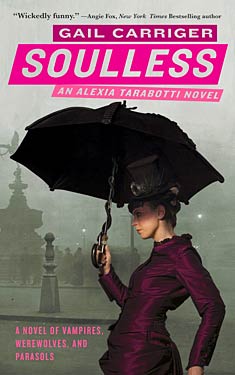 Tanya F. (metalorchid), has been a fan of sci-fi since childhood, a love that kicked off with Ray Bradbury’s The Martian Chronicles. She enjoys plots that involve time travel and alternate histories, but also can’t resist a lengthy, world weaving fantasy epic, or a well crafted short horror story.
Tanya F. (metalorchid), has been a fan of sci-fi since childhood, a love that kicked off with Ray Bradbury’s The Martian Chronicles. She enjoys plots that involve time travel and alternate histories, but also can’t resist a lengthy, world weaving fantasy epic, or a well crafted short horror story.
 Considering that this is my first book read and reviewed for the 2013 Women of Genre Fiction challenge, I feel a twinge of regret that I’m starting off on a low note, especially since so many people have raved about the Parasol Protectorate series and I’ve been intrigued by the cover image of the woman in purple taffeta, wearing a determined expression as she makes her way through foggy London. (Kudos, cover designer!)
Considering that this is my first book read and reviewed for the 2013 Women of Genre Fiction challenge, I feel a twinge of regret that I’m starting off on a low note, especially since so many people have raved about the Parasol Protectorate series and I’ve been intrigued by the cover image of the woman in purple taffeta, wearing a determined expression as she makes her way through foggy London. (Kudos, cover designer!)
The chief problem I found with Soulless is that it doesn’t quite know what it is. The story of the titular “soulless” protagonist, the quick witted and fiercely independent “spinster” Alexia Tarabotti, weaves elements of Gothic mystery, steampunk, classic (and supernatural) romance, and humor. But, unlike the theory of equilibrium discussed in certain detail by some scientists in the novel, Soulless doesn’t actually strike a balance among all its influences.
For starters, there are numerous repetitive, intended as comedic, allusions to Alexia’s Italian physique and temperament that really start to wear thin. There are also more than a few instances where characters react to their situations with clever little quips that aren’t actually spoken out loud. A lot of these details, which maybe I picked up on because I tend to dislike repetitive humor, seem to present a constant effort on Carriger‘s part to make us remember that these characters are clever, oh so clever! And interesting! And complex! It’s a little too much telling and not enough showing.
The comic air surrounding the romance between Alexia and her chief love interest in the book actually detracted from any sympathy or attachment I would have felt for the two. Generally, I would cheer for a couple I’d really like to see make it, and logically, they are such a couple. But all the jokes and awkward interactions felt forced yet again.
The shining and standout part of the book for me isn’t the romance or the humor, but the action and intriguing world weaving. Carriger’s description of the the structures of British society where supernaturals and humans coexist in regulated manner is really cool. I also appreciate the level of detail provided to “putting a cog on it” by actually having the scientists in the book explain and actively use various “steampunk” devices in the novel. And the build up of the antagonistic force in the book, working against the main characters, definitely had me asking questions as I was reading, and slowly revealing clues in a very satisfying way. To me, this is where the author’s strength lies, in the intricate story development and weaving of details, rather than in the character development, which I found lackluster.
On the other hand, bless this book for having a determined young woman (even if society of the novel deems her far past her prime) as an active hero. While there is certainly quite a bit of rescuing of her that takes place, she also does pretty well to defend herself and maneuver various situations when she’s confronted with danger, or just awkward social interactions.
 One aside on Alexia’s character: as a “preternatural” who is devoid of soul, I can certainly understand how she might not have the certain intuitive, emotional response to people and situations that the more (uh, “ensouled?” people might?) but she also is really quite mean. As her family are a simpering lot, as families of that time probably would have been, hemming and hawing and clucking about her, I can see how Alexia’s thoughts on them would be less than amicable. However, her treatment of her supposed dearest, best friend Ivy Hisslepenny, is condescending and quite insulting. You’d have to read the book, but the number of little offhand remarks she either makes or thinks about her friend make me think of the old adage of “With friends like these…”
One aside on Alexia’s character: as a “preternatural” who is devoid of soul, I can certainly understand how she might not have the certain intuitive, emotional response to people and situations that the more (uh, “ensouled?” people might?) but she also is really quite mean. As her family are a simpering lot, as families of that time probably would have been, hemming and hawing and clucking about her, I can see how Alexia’s thoughts on them would be less than amicable. However, her treatment of her supposed dearest, best friend Ivy Hisslepenny, is condescending and quite insulting. You’d have to read the book, but the number of little offhand remarks she either makes or thinks about her friend make me think of the old adage of “With friends like these…”
All in all, I can’t say I wouldn’t recommend this book. It’s a very quick, fun read, and I might actually check out the next installment. But I hope that by book 2, Carriger perhaps would have hit a more solid stride and struck a better balance. My soul would thank her for it.